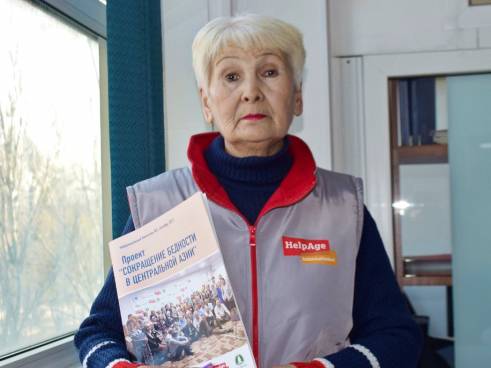A firsthand account: Supporting older people during COVID-19 in Kyrgyzstan

Zinaida, 70, lives in Bishkek, Kyrgyzstan. She is a pensioner and a volunteer taking care of single older people and older people with disabilities. She is a self-help group leader in Age International’s project on diabetes prevention and treatment. Prior to the state of emergency, she disseminated information on the prevention of COVID-19. Now she provides moral support to older people over the phone from home.
“I learned about COVID-19 at a training session organised by the Red Crescent before the state of emergency was announced. I learned about prevention measures. I have a special mask, gloves and I wear glasses. I am very careful with the use of disinfectants. They gave me leaflets and posters about COVID-19 and then I conducted training for older people. I visited them at their houses, put up posters and handed out leaflets. I also went to the market and handed out leaflets to food sellers. I raised awareness of COVID-19 to 250 people".
In a state of emergency and without public transport older people who live in poorer conditions have to walk far to get to food markets. Because of the lack of transport, Zinaida can’t visit the older people she looks after who live far away.
“The other day I tried to get to one of the older people I provide care to, but I was stopped by a police patrol, and I had to return home. Since the state of emergency is in place, I am very worried about them. I myself stay at home, and I call them on the phone and advice those who have diabetes and other chronic diseases not to leave home at all. It’s good that there are volunteers from ageing organisations that bring them food on bicycles.”
The vast majority of older people in Kyrgyzstan have low pensions and worry about being able to afford food. Even those who can leave their homes and can take care of themselves, are panicking because the price of food has increased.
“I'm trying to calm them down, help them mentally. I tell them to be patient, soon the state of emergency will end and normal life will return. The most important thing is to follow the necessary precautions to avoid the spread of the virus." The burden on the healthcare system has increased terribly.
“There are not enough masks in pharmacies. In places where there are still some, they only give three per person. The price of disinfectants has increased. This is very unpleasant. Recently, I tried to call an ambulance for an older person who got sick, but the number was busy and I could not get through. I had to call the rescue service. Fortunately, it turned out to be a common cold.”
Zinaida believes that the government is sufficiently informing the public about precautions against COVID-19 but older people are afraid. “Many older people are very scared by the reports of many deaths from other countries. This causes panic. People over 80 are especially worried. The most important thing is to reassure people which I try to do. I tell them: 'we have experienced so much in our life, we will survive this too'.”
Zinaida believes that when the pandemic is over, people should remain aware of the need for personal hygiene. “I think the fear of becoming infected will continue, and people will try to protect themselves. Older people will be afraid of leaving home for some time."
Read more about our COVID-19 response in Kyrgyzstan and the rest of the Eurasia and the Middle East
Read more stories from the ground
Read more of the latest news and stories on our work in combating the coronavirus in low to middle income countries.
Help us to continue supporting older people around the world
Whether with better healthcare, a secure income or life-saving aid – your gift could help change lives.
 Follow us on social media
Follow us on social media
Keep seeing our stories or ask us a question - connect on Facebook and Twitter.
